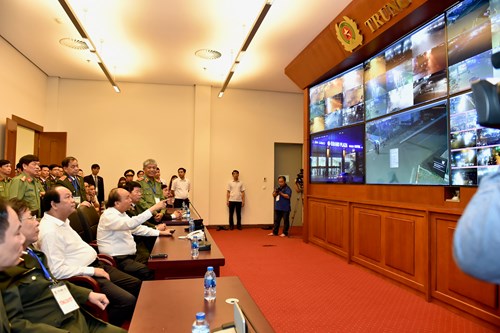The Prime Minister inspected venues for the activities within the framework of the events, including the GMS Senior Officials’ Meeting, the GMS Business Summit, the sixth GMS Retreat, the GMS-6, the CLV-10, and the Gala Dinner.
The Government leader affirmed that the GMS-6 and CLV-10 are two among the biggest multilateral events hosted by Vietnam in 2018. They are opportunities for the GMS leaders to discuss measures to boost investment cooperation, regional connectivity, trade promotion, and sustainable management and use of natural resources.
    |
 |
|
PM Nguyen Xuan Phuc chairs the rehearsal. Photo: VGP |
This is also a chance for Vietnam to reiterate its commitments and contributions to the Mekong cooperation mechanisms in general and in the GMS, CLV in particular, while boosting regional cooperation to serve its socio-economic development goals, he said.
The PM urged subcommittees, secretariat and relevant ministries to ensure thorough preparations for the events in terms of organization work, protocol, press conferences, logistics, security, health care, in line with the practices of the GMS and CLV summits in an effective and saving manner.
The events should show international friends Vietnam’s hospitality and potential, as well as the beauty of Vietnamese people, while giving Vietnamese people an insight of the significance of the conferences, he noted.
The sixth Greater Mekong Sub-region Summit, themed “Leveraging 25 years of cooperation, Building an integrated, sustainable and prosperous GMS aims to celebrate the 25th founding anniversary of the GMS Program and define cooperation orientations to build a region of prosperity, integration and sustainable development.
GMS was established in 1992 as an initiative of the Asian Development Bank (ADB). The GMS Program is the most complete cooperation program that involves Vietnam, Laos, Cambodia, Thailand, Myanmar, and China’s Yunnan and Guangxi provinces. Priority fields include infrastructure development, energy, telecommunications, tourism, trade-investment, human resources, and the environment.
Meanwhile, the CLV-10 is meant to review the implementation of the Master Plan for Socio-Economic Development of the CLV Development Triangle Area for 2010-2020 and discuss cooperation orientations in the coming time, especially seeking to increase the trilateral economic connectivity.
The CLV Development Triangle Area was established in 1999, covering Vietnam’s Kon Tum, Gia Lai, Dak Lak, Dak Nong provinces; Laos’ Sekong, Attapeu and Saravan provinces; and Cambodia’s Stung Treng, Rattanak Kiri, and Mondul Kiri. In 2009, the three countries agreed to add Vietnam’s Binh Phuoc province, Cambodia’s Kratie province, and Laos’ Champasak province to the area. Its cooperation focuses on the fields of security, external affairs, transport, industry, agriculture, trade, investment and environmental protection.
Source: VNA